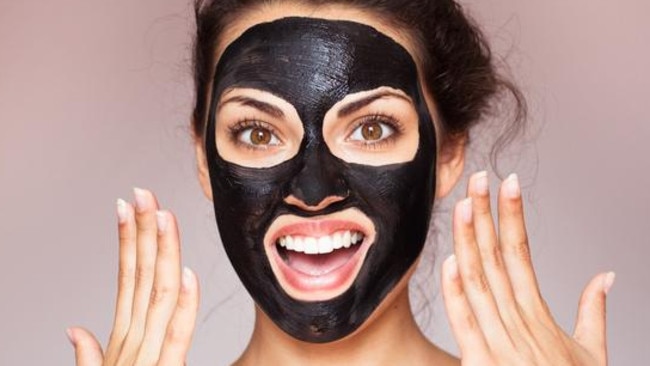Do charcoal peel-off face masks actually work?
YOU can’t scroll through Instagram without seeing a video of someone peeling off a charcoal face mask. But our skin expert is skeptical about how good they actually are.

CHARCOAL peel-off masks are one of the biggest beauty trends at the moment.
Have a quick scroll through Instagram or YouTube and you’ll find beauty gurus smothering black gloop on their faces and peeling it off, often while cringing, to examine the extracted impurities.
It’s clear this process can be quite … uncomfortable. Given the pain, are these charcoal peel-off masks as effective as they seem?

THE BENEFITS OF CHARCOAL
First of all, let’s take a look at the medicinal qualities of activated charcoal – that is, charcoal that has undergone a heating process to destroy toxins and increase its porosity. The first recorded medicinal use of activated charcoal is by the Egyptians back in 1500 B.C. who used it to absorb horrible odours from decaying intestinal tracts. In 400 B.C., Hippocrates pointed to charcoal as a treatment of many diseases, like anthrax and epilepsy.
When looking to nature, the most cited example of animals using charcoal medicinally concerns the African Red Colobus monkeys. Apparently these primates digest charcoal after eating toxic leaves and fruits. In the modern world, hospitals continue to use activated charcoal, especially for poisoning cases, as it works to remove toxins in the body.
When it comes to clogged pores, activated charcoal is also a winner. It binds itself to oxidised impurities, which can then be washed away.
THE PEELING PART ISN’T GREAT
The peeling action of some face masks can actually do more harm than good – especially as some DIY masks and those bought in-store can contain Polyvinyl Alcohol (PVA), which is a strong adhesive ingredient used in powerful glues. Experts explain that peel-off masks give the illusion of blackhead-free skin. However, they only remove the blackheads’ keratin plugs, still leaving behind the dirt, oils, and impurities behind.
Peel off face masks basically strip off the top layer of skin and precious vellus hair, which results in that silky smooth feeling. This action also removes essential oils and protective cells, which are important to support healthy skin and avoid harmful pollutants, dryness, and irritation. If you have active acne breakouts, using these peels could result in further damage to the skin surface layer and trigger adverse skin reactions.
The blackheads you’re trying to tackle with peel-off masks might not even be blackheads at all, but rather necessary sebaceous filaments. These can be confused with blackheads as they appear grey from the oxidised sebum. When ripping off a mask, you’re pulling out these filaments only to have them re-form within 30 days. In other words, the root causes of blackheads - a form of acne - which occur inside your body are not addressed at all.
HERE’S WHAT YOU SHOULD USE INSTEAD
So what products should you turn to if you’re looking to unclog and purify your pores? If you’re dealing with persistent blackheads, it may be prudent to speak to a professional dermatologist and understand which path is the best treatment for you.
I suggest sufferers try to understand the root causes of skin congestion - hormonal fluctuations, overactive sebum production, exacerbated stress and weak immunity.
A pimple or acne treatment should include powerful nutritional supplements that contain ingredients at a higher potency. These target the root causes simultaneously and therefore effectively control the condition, working to support inner body chemistries to achieve clear skin without side effects, rather than just treating the symptoms on the surface.
A gentler way to improve your skin is using products containing salicylic acid.
Some of these products feature no more than 0.5 per cent salicylic acid, as well as other acne-fighting ingredients to help you achieve healthy, glowing skin without the tearing pain.
Other low impact masks containing natural ingredients like clay or avocado oil can naturally control bacteria, extract impurities and nourish the skin.
Using a natural sea sponge or a good quality cotton face cloth to wash the mask off is a skin-friendly, low cost and effective way to exfoliate the skin daily.
The next time you’re tempted to use a peel-off face mask, just remember it may further damage, not improve, the condition of your skin.
Judy Cheung-Wood is the President of Australia China Nutrition and Health Association and the founder and managing director of skincare line SkinB5.

